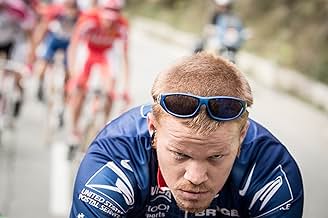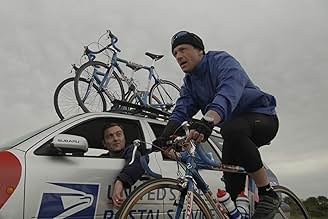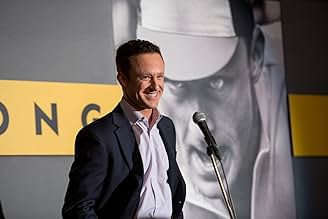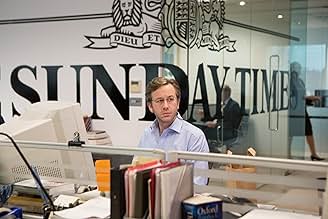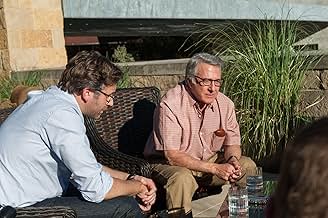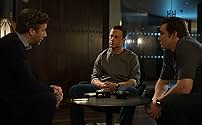CALIFICACIÓN DE IMDb
6.5/10
20 k
TU CALIFICACIÓN
Un periodista deportivo irlandés está convencido de que las victorias de Lance Armstrong del Tour de Francia se deben a sustancias prohibidas. Con esta convicción, comienza a buscar evidenci... Leer todoUn periodista deportivo irlandés está convencido de que las victorias de Lance Armstrong del Tour de Francia se deben a sustancias prohibidas. Con esta convicción, comienza a buscar evidencia que exponga a Armstrong.Un periodista deportivo irlandés está convencido de que las victorias de Lance Armstrong del Tour de Francia se deben a sustancias prohibidas. Con esta convicción, comienza a buscar evidencia que exponga a Armstrong.
- Dirección
- Guionistas
- Todo el elenco y el equipo
- Producción, taquilla y más en IMDbPro
Argumento
¿Sabías que…?
- TriviaIn an interview with The Guardian, Ben Foster admitted to taking performance-enhancing drugs under medical supervision to prepare for the role.
- ErroresA number of The Sunday Times newspaper front pages on display around the office were published after the time the scenes are set. Most notably, the front cover depicting English Rugby player Johnny Wilkinson winning the 2003 World cup in a scene set in 2001.
- Citas
[repeated line]
Lance Armstrong: I have never tested positive for performance enhancing drugs.
- Bandas sonorasBlitzkrieg Bop
Written by Joey Ramone, Dee Dee Ramone (as Dede Ramone), Johnny Ramone, Tommy Ramone
Performed by Ramones
Courtesy of Warner Music UK Ltd
Opinión destacada
On paper, the life of Lance Armstrong lends itself to a cinematic interpretation quite nicely, but The Program, Stephen Frears' restless, showy Armstrong biopic, feels undercooked and premature. Though Ben Foster's Armstrong jokes about Hollywood's plan for a movie about his life (complete with smirky mispronunciations of Jake Gyllenhaal), his against-the-odds underdog tale was never going to be the more compelling film compared to the true story. It's a small mystery as to why Frears decides to play the first half hour of The Program in such a headspace, urging us to cheer for an idealized version of the famed cyclist despite the inevitable mess that awaits us just around the corner. Such an unnecessary sprawl as we turn through a run-of-the-mill rise-through-the-ranks before the downfall is unkind to detail; instead, it feels like a compromise to make the whole thing go down easier for those unaware of the controversy, and thus the film is probably not quite as invested in the scandals in the first place.
Though The Program is clumsy in its execution and handling of loaded material, it nails its depiction of key moral dilemmas surrounding not just Armstrong's doping scandal that eventually stripped him of his professional accolades–including his seven Tour de France titles– but also effectively ended his athletic career with a worldwide ban from most competitive sports. If Chris O'Dowd's journalist, David Walsh, takes down Lance Armstrong, which he spends the majority of the film trying to do, he's taking down not only massive and respectable cancer charities associated with Armstrong, but also the integrity of the sport itself. The film acknowledges that most cyclists were doping at the time, but it tries to shave down its theme to that point while ignoring juicier social commentary regarding our misguided hero worship culture and how we react to the controversies. There's a lot of meat to chew on that remains untouched on the plate, but perhaps Frears already felt his hands full up with a narrative that's far more focused on the interplay between Armstrong and the man determined to expose his skeletons.
As Armstrong, Foster has the drive, the resemblance, and he can balance light and dark in a way that fits the conflicted tone of the man in reality and the fictionalized version of him. It's a shame, for the most part, that Foster tries too hard for too little payoff, almost desperately searching for Oscar clips, but it's John Hodge's screenplay that ultimately lets him down hard, indulging in trite lines that stick out. In a sense, it fits the Armstrong mantra to be over- rehearsed and only approaching an aura of naturalness, though it doesn't work for Foster. His performance here is similar to Anne Hathaway's in Les Miserables, but he's rarely offered the emotional potency to justify his tone. It's still good work, he's just operating on a different gear to everyone else when he should be leading the pack. While the tone of the film feels like easy resort, at the very least it does a good job of showing the gravity of Armstrong's actions and the gravity of Walsh's accusations.
While Foster may falter, The Program boasts a strong ensemble overall, which also includes Dustin Hoffman, Lee Pace, and Jesse Plemons. O'Dowd made his name in the tongue-in-cheek TV riot The IT Crowd, but he's hard to take seriously in dramas or comedies in both America or Britain. He consistently feels like a novelty more than a talent. Here, he's toe-to-toe with Foster and showing his dramatic potential. While he has one note to play (determined exasperation), he plays it well and pleasantly engages us. Plemons has another underused snitch role to play (to reference his brief turn in Black Mass this year) and brings that same quiet menace that made his Todd on Breaking Bad so magnetic. It's also nice to see Denis Menochet, most memorable in the opening of Inglourious Basterds, to have a meatier role spread across an entire film here as Armstrong's trainer.
Despite its shortcomings, The Program is still largely entertaining, if not enthralling, which it earnestly tries to be. The whiplash editing of its various race sequences would have worked had the film itself been gunning for a darker subtext, but they're left to hang on the screen and thrill in the moment. The film's lowest point, however, is its on-the-nose rota of soundtrack choices. It feels too needy, whereas the rest of the film can get away with what it's doing. Unfortunately, the film's narrative ends far too early. Anyone who has seen Alex Gibney's excellent The Armstrong Lie knows that there's an extra side to the story, and a compelling third act that The Program isn't interested in digging through. In fairness, it's not trying to be "that movie," but what it does dramatize is mostly good enough.
7/10
Read more @ Serving Cinema (http://www.servingcinema.com/)
Though The Program is clumsy in its execution and handling of loaded material, it nails its depiction of key moral dilemmas surrounding not just Armstrong's doping scandal that eventually stripped him of his professional accolades–including his seven Tour de France titles– but also effectively ended his athletic career with a worldwide ban from most competitive sports. If Chris O'Dowd's journalist, David Walsh, takes down Lance Armstrong, which he spends the majority of the film trying to do, he's taking down not only massive and respectable cancer charities associated with Armstrong, but also the integrity of the sport itself. The film acknowledges that most cyclists were doping at the time, but it tries to shave down its theme to that point while ignoring juicier social commentary regarding our misguided hero worship culture and how we react to the controversies. There's a lot of meat to chew on that remains untouched on the plate, but perhaps Frears already felt his hands full up with a narrative that's far more focused on the interplay between Armstrong and the man determined to expose his skeletons.
As Armstrong, Foster has the drive, the resemblance, and he can balance light and dark in a way that fits the conflicted tone of the man in reality and the fictionalized version of him. It's a shame, for the most part, that Foster tries too hard for too little payoff, almost desperately searching for Oscar clips, but it's John Hodge's screenplay that ultimately lets him down hard, indulging in trite lines that stick out. In a sense, it fits the Armstrong mantra to be over- rehearsed and only approaching an aura of naturalness, though it doesn't work for Foster. His performance here is similar to Anne Hathaway's in Les Miserables, but he's rarely offered the emotional potency to justify his tone. It's still good work, he's just operating on a different gear to everyone else when he should be leading the pack. While the tone of the film feels like easy resort, at the very least it does a good job of showing the gravity of Armstrong's actions and the gravity of Walsh's accusations.
While Foster may falter, The Program boasts a strong ensemble overall, which also includes Dustin Hoffman, Lee Pace, and Jesse Plemons. O'Dowd made his name in the tongue-in-cheek TV riot The IT Crowd, but he's hard to take seriously in dramas or comedies in both America or Britain. He consistently feels like a novelty more than a talent. Here, he's toe-to-toe with Foster and showing his dramatic potential. While he has one note to play (determined exasperation), he plays it well and pleasantly engages us. Plemons has another underused snitch role to play (to reference his brief turn in Black Mass this year) and brings that same quiet menace that made his Todd on Breaking Bad so magnetic. It's also nice to see Denis Menochet, most memorable in the opening of Inglourious Basterds, to have a meatier role spread across an entire film here as Armstrong's trainer.
Despite its shortcomings, The Program is still largely entertaining, if not enthralling, which it earnestly tries to be. The whiplash editing of its various race sequences would have worked had the film itself been gunning for a darker subtext, but they're left to hang on the screen and thrill in the moment. The film's lowest point, however, is its on-the-nose rota of soundtrack choices. It feels too needy, whereas the rest of the film can get away with what it's doing. Unfortunately, the film's narrative ends far too early. Anyone who has seen Alex Gibney's excellent The Armstrong Lie knows that there's an extra side to the story, and a compelling third act that The Program isn't interested in digging through. In fairness, it's not trying to be "that movie," but what it does dramatize is mostly good enough.
7/10
Read more @ Serving Cinema (http://www.servingcinema.com/)
- Sergeant_Tibbs
- 23 oct 2015
- Enlace permanente
Selecciones populares
Inicia sesión para calificar y agrega a la lista de videos para obtener recomendaciones personalizadas
- How long is The Program?Con tecnología de Alexa
Detalles
Taquilla
- Total en EE. UU. y Canadá
- USD 13,074
- Fin de semana de estreno en EE. UU. y Canadá
- USD 5,763
- 20 mar 2016
- Total a nivel mundial
- USD 3,335,613
- Tiempo de ejecución1 hora 44 minutos
- Color
- Relación de aspecto
- 2.35 : 1
Contribuir a esta página
Sugiere una edición o agrega el contenido que falta

Principales brechas de datos
By what name was El engaño del siglo (2015) officially released in India in English?
Responda






